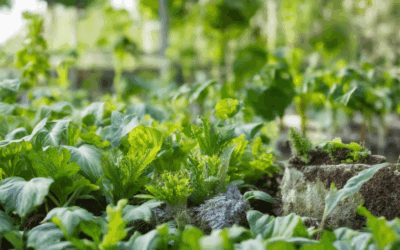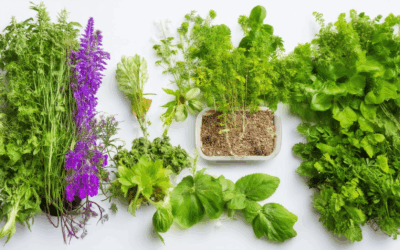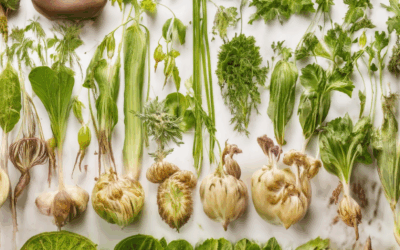Heritage seeds have long been celebrated for their unique characteristics and historical significance in agriculture, offering a natural and sustainable alternative for small-scale farming practices. For those looking to cultivate resilient crops with distinct flavor profiles, heritage seeds present a compelling choice. This article delves into the benefits of using heritage seeds for small farms, exploring why they are considered ideal and how they thrive in diverse growing conditions. From their adaptability to their ability to enhance both yield and taste, heritage seeds are proving to be a valuable asset for eco-conscious and traditional farming methods. Whether you’re a seasoned farmer or new to sustainable practices, understanding the advantages of heritage seeds can make a significant difference in your farming operations. Join us as we uncover the reasons why heritage seeds are becoming a preferred option for small farms worldwide.
Key Takeaways
- Resilience Against Pests and Diseases: Heritage seeds offer natural resistance to pests and diseases, reducing reliance on synthetic chemicals.
- Superior Flavor and Nutrient Density: They produce crops with richer flavors and higher nutrient content, appealing to health-conscious consumers.
- Sustainable Farming Practices: Open-pollination and adaptability minimize chemical use and synthetic inputs, supporting eco-friendly practices.
- Diverse Crop Options: A wide variety of heritage seeds enhances biodiversity and allows small farms to experiment with different crops.
- Market Demand: Consumers value heirloom products, offering a premium pricing opportunity for small farms.
- Preservation of Agricultural Diversity: Heritage seeds protect genetic diversity, crucial for future agricultural resilience.
- Adaptability: They thrive in diverse conditions, requiring less input and water, making them ideal for small-scale farming.
- Economic Viability: Cost-effectiveness and consistent yields make heritage seeds a practical choice for small farms.
- Genetic Diversity: Unique traits provide resistance and adaptability, benefiting both farm productivity and environmental health.
Benefits of Using Heritage Seeds for Small Farms
- Resilience and Adaptability: Heritage seeds are known for their ability to thrive under various conditions, making them ideal for small-scale farming where resources may be limited. They are less susceptible to pests and diseases compared to hybrid varieties, ensuring better yields and reduced reliance on synthetic chemicals.
- Superior Flavor and Nutrition: These seeds often produce plants with richer flavors and higher nutrient content. For small farms focusing on quality and health-conscious consumers, this can be a significant advantage.
- Sustainable Farming Practices: Heritage seeds are typically open-pollinated, allowing farmers to save their own seeds for future use. This reduces reliance on external seed suppliers and supports self-sufficiency, which is particularly beneficial for small-scale operations.
- Cultural and Historical Significance: Many heritage seeds have deep roots in local cultures and histories. Growing these seeds can connect small farm owners with their cultural heritage while preserving biodiversity.
For more information on selecting the best heritage seeds for your farm, visit Seed Savers or High Mowing Organic Seeds .
Best Heritage Seeds for Small Farms
When selecting heritage seeds for small farms, it’s essential to choose varieties that are adaptable, productive, and suited to sustainable farming practices. These seeds offer resilience, diverse crop options, and historical significance, making them ideal for eco-conscious farming efforts.
- Tomato Varieties: Heirloom tomatoes are excellent choices due to their flavor, diversity, and adaptability. Varieties like “Black Krimson” or “Green Zebra” are highly recommended for small farms, offering both yield and unique flavors.
- Corn Varieties: Heritage corn seeds, such as “Blue Kernel” or “Golden Bantam”, are perfect for smaller plots. They thrive in diverse conditions and provide a range of textures and colors.
- Bean Varieties: Heirloom beans like “Painted Mountain” or “Tiger Cub” are excellent for small farms. They are drought-resistant and offer a variety of colors and uses, from fresh harvest to dried storage.
- Squash Varieties: Winter squash such as “Butternut” or “Honey Bear” grow well in smaller spaces and provide long-term storage potential, making them a wise choice for sustainable farming.
- Cucumber Varieties: “Kirby” or “Pickling” cucumbers are great for small farms due to their compact growth and high yield, ideal for fresh market or pickling purposes.
To maximize productivity and sustainability, consider combining these heritage seeds in diverse crop rotations. This approach enhances soil health, reduces pest risks, and ensures a balanced ecosystem. For further insights and planting guides, explore Old Seed’s comprehensive guide on heritage seed cultivation.
Best Heritage Seeds for Small Farms
When selecting heritage seeds for small farms, it’s essential to choose varieties that are durable, disease-resistant, and adapted to local growing conditions. These seeds offer a mix of tradition, sustainability, and resilience, making them ideal for eco-conscious farming practices.
Categories of Heritage Seeds
- Open-Pollinated Seeds: These seeds rely on natural pollination methods, making them easier to grow without additional support. Varieties like Tommy Atkins Blackberry Tomato and Butterfly Mix are excellent choices for small farms.
- Heirloom Seeds: Heirloom varieties are open-pollinated and passed down through generations. Seeds like Cherokee Purple Eggplant and Amish Nettle are perfect for sustainable farming.
- Rare and Unusual Varieties: For unique and exotic options, consider Dragon’s Tongue Bean and Lakshmi Radish . These seeds add interest and diversity to your farm.
Top Picks for Small Farm Sustainability
- Organic Spinach Seeds: A popular choice for leafy greens, Old Seed’s Organic Spinach is known for its hardiness and nutrient density.
- Winter Squash Seeds: Old Seed’s Winter Squash variety is ideal for storage and winter months, offering long-term storage capabilities.
- Golden Rice Seeds: Perfect for organic rice cultivation, Old Seed’s Golden Rice supports both nutritional and economic goals.
Where to Source Heritage Seeds
- Local Seed Libraries: Check out local seed libraries or cooperatives like Seed Libraries Network for diverse options tailored to your region.
- Specialized Seed Suppliers: Companies like Seed Sovereignty and Johnny’s Selected Seeds offer curated heritage seed collections.
- Community Supported Agriculture (CSA): Subscribe to CSA programs that include heritage seeds, ensuring access to fresh, locally-grown varieties.
By choosing heritage seeds, you contribute to biodiversity conservation and sustainable farming practices. These seeds are not just crops—they are a legacy for future generations. Start your journey with Old Seed today and discover the joy of growing your own heritage seeds!
Why Small Farms Should Consider Heritage Seeds
Heritage seeds offer numerous benefits for small farms, making them a valuable addition to sustainable farming practices. Here’s why:
- Resilience Against Pests and Diseases: Heritage seeds are naturally resistant to pests and diseases due to their genetic diversity and historical adaptation to various environments. This resilience allows small farms to thrive without relying heavily on chemical pesticides or fungicides.
- Superior Flavor and Nutrient Density: These seeds often produce crops with richer flavors and higher nutrient content compared to modern hybrid varieties. This makes them ideal for farmers who prioritize taste and nutritional quality, whether for direct sales or local markets.
- Sustainable Farming Practices: Heritage seeds are typically open-pollinated, meaning they can be saved for future use, reducing reliance on annual seed purchases. Their ability to adapt to local conditions minimizes the need for synthetic fertilizers and pesticides, aligning with eco-conscious farming methods.
- Diverse Crop Options: Heritage seeds come in a wide range of varieties, each with unique characteristics. This diversity allows small farms to experiment with different crops, enhancing biodiversity and creating more balanced cropping systems.
- Market Demand: There is a growing consumer demand for heirloom and heritage-grown products. Many consumers are willing to pay a premium for seeds that promise better flavor, health benefits, and a connection to tradition. This can be a lucrative opportunity for small farms looking to differentiate themselves in the market.
By embracing heritage seeds, small farms can enhance their sustainability, improve the quality of their crops, and tap into a niche market. This approach not only benefits the farm but also contributes to preserving traditional agricultural knowledge for future generations.
Why Are Heritage Seeds Ideal for Small Farms?
Heritage seeds are an excellent choice for small farms due to their numerous advantages:
- Non-GMO and Chemical-Free: Heritage seeds are naturally grown without synthetic chemicals, making them safer for both the environment and human health.
- Adaptability: These seeds are highly adaptable to various climate conditions and soil types, allowing them to thrive in diverse farming setups without additional inputs.
- Pest and Disease Resistance: Heritage seeds often exhibit natural resistance to common pests and diseases, reducing the need for chemical treatments.
- Nutritional Value: They tend to have higher nutrient content compared to modern hybrid varieties, offering better yields in terms of food quality and health benefits.
- Sustainability: By using heritage seeds, farmers can maintain soil health and reduce environmental impact, aligning with eco-friendly practices.
- Economic Viability: Their ability to perform well under minimal intervention makes them cost-effective for small-scale operations.
- Preservation of Agricultural Diversity: Heritage seeds help protect genetic diversity, which is essential for biodiversity and future agricultural resilience.
When comparing to other seed options, heritage seeds stand out for their traditional reliability and performance in smaller farming contexts. They embody a commitment to sustainable practices and community-supported traditions, making them a wise choice for environmentally conscious farmers.
For more information on how to get started with heritage seeds, visit our resource hub and explore our guide to heirloom gardening.
How Do Heritage Seeds Benefit Small Farms?
Heritage seeds offer numerous advantages for small-scale farmers seeking to enhance productivity and sustainability. Here’s a breakdown of their benefits:
- Preservation of Genetic Diversity: Heritage seeds carry unique genetic traits passed down through generations, making them resistant to pests and diseases. This trait helps in maintaining crop health and reducing reliance on synthetic pesticides.
- Adaptability to Local Conditions: These seeds are bred to thrive in specific climates and soil types, making them ideal for small farms with limited resources. They require less water and fewer inputs, minimizing environmental impact.
- Improved Yields Over Time: By selecting seeds that suit local conditions, farmers can expect consistent and higher yields compared to conventional varieties. This makes heritage seeds a cost-effective choice for small-scale operations.
- Enhanced Nutritional Value: Heritage seeds often contain higher levels of nutrients like antioxidants and vitamins compared to modern hybrids. This can lead to better food quality and health benefits for farm owners and consumers.
- Sustainable Farming Practices: Using heritage seeds supports eco-friendly farming methods. They promote biodiversity, reduce chemical use, and contribute to carbon sequestration, aligning with sustainable agriculture goals.
- Resistance to Pests and Diseases: Heritage seeds are naturally resilient to common pests and diseases due to their diverse genetic makeup. This reduces the need for chemical treatments, lowering production costs and environmental impact.
By incorporating heritage seeds into their farming practices, small-scale farmers can enjoy improved productivity, better resilience against climate changes, and a more sustainable farming method that aligns with environmental stewardship.








0 Comments